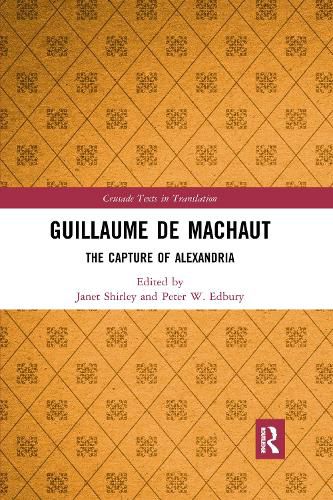Readings Newsletter
Become a Readings Member to make your shopping experience even easier.
Sign in or sign up for free!
You’re not far away from qualifying for FREE standard shipping within Australia
You’ve qualified for FREE standard shipping within Australia
The cart is loading…






Guillaume de Machaut, a man famous for both his poetry and his musical compositions, wrote his Prise d'Alexandrie (or Capture of Alexandria) just a few years after the death of his hero, King Peter I of Cyprus (1359-69). It is a verse history of Peter’s reign, and was Machaut’s last major literary work. Peter’s ancestors had ruled the island of Cyprus since the 1190s, and in 1365 Peter gained notoriety throughout western Europe as leader of a crusading expedition which captured the Egyptian port of Alexandria. His forces, however, were unable to retain control, and Peter was left with a war against the Egyptian sultan. It was his increasingly desperate measures to continue the struggle and carry opinion with him that resulted in his murder in 1369. Machaut relied on information relayed by French participants in Peter’s wars, but although he was not an eyewitness of these events, his account is independent of other narratives of the reign which were written in Cyprus apparently under the auspices of the king’s heirs.
$9.00 standard shipping within Australia
FREE standard shipping within Australia for orders over $100.00
Express & International shipping calculated at checkout
Guillaume de Machaut, a man famous for both his poetry and his musical compositions, wrote his Prise d'Alexandrie (or Capture of Alexandria) just a few years after the death of his hero, King Peter I of Cyprus (1359-69). It is a verse history of Peter’s reign, and was Machaut’s last major literary work. Peter’s ancestors had ruled the island of Cyprus since the 1190s, and in 1365 Peter gained notoriety throughout western Europe as leader of a crusading expedition which captured the Egyptian port of Alexandria. His forces, however, were unable to retain control, and Peter was left with a war against the Egyptian sultan. It was his increasingly desperate measures to continue the struggle and carry opinion with him that resulted in his murder in 1369. Machaut relied on information relayed by French participants in Peter’s wars, but although he was not an eyewitness of these events, his account is independent of other narratives of the reign which were written in Cyprus apparently under the auspices of the king’s heirs.